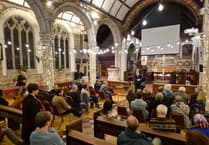IN any society, you need the rule of law and order.
Cornwall Council has some role in this, for example, the council oversees all the roads in South East Cornwall, except for the A38, which is operated by National Highways.
Utility companies that want to dig up a road to install or repair pipes or wires must apply for a permit, only issued when they provide details of their traffic management plan, which is then advertised.
A lane or narrow road may need to be shut, with the diversion signposted, but normally it just needs traffic lights with warning signs. The traffic management relies on drivers obeying another set of rules, in this case the highway code, with drivers allowed to go through the lights only when they are on green.
Recently, people have been driving through the traffic lights on Polperro Road, Looe, when they are on amber, which causes them to shut down for five minutes. This long waiting time leads to people driving through on red, causing another five minute delay in operation, which, combined with breakdowns with the lights, leads to chaos, which I have reported back to Core, the traffic management company, and the utility company, Wales and West, that contracts them.
However, the issue is outside my control. I have threatened to object to all of their permits in my division, but in practice it will be difficult to stop them from maintaining their infrastructure.
Of course, responsibility to enforce the law of the land rests with the police. Up to 2011 the police were advised by the Police Authorities, made up of elected councillors, magistrates and independent members.
This worked well as there was representation from the whole area covered by the police force. When in government, the Tories delivered their manifesto promise to establish Police & Crime Commissioners (PCCs). This was intended to allow the Home Office to withdraw from day-to-day policing matters, giving the police greater freedom to fight crime as they see fit, with the commissioner having to stand for election every four years.
However, elections were politically driven, with commissioners building networks of their own and staff costing millions of pounds per year, all of which took resources away from core policing duties.
The Liberal Democrats have been campaigning for years for the position to be abolished. In Westminster, Ben Maguire, MP for North Cornwall, warmly welcomed the government decision to scrap PCCs, condemning them as a “failed Tory experiment” - whilst Andrew George, MP for St Ives, called on Alison Hernandez, our PCC, to resign from her role “with immediate effect”.
With her role not being scrapped until 2028, she will become a lame duck.
Ben added that he would like savings from scrapping PCC's to be spent on bolstering frontline policing so they can tackle rural crime and antisocial behaviour. After 2028, the responsibility for overseeing the police will instead be handed to a new 'Policing and Crime Boards', so we will return to a more democratic system.
.jpeg?width=752&height=500&crop=752:500)




Comments
This article has no comments yet. Be the first to leave a comment.